- Home
- Connilyn Cossette
Shadow of the Storm Page 29
Shadow of the Storm Read online
Page 29
“I forgive you.”
The words that cut into my bitter memories were clear, their meaning plain, but disbelief screwed my face into a painful scowl. What was she trying to do? Manipulate me? Make herself look righteous before sending me to the elders to be condemned like Hassam?
She leaned down until she was a handspan from my face. “I have had two days to think. Two days to weigh what I would say when you awakened. And here it is—I forgive you.”
As she watched my silent astonishment, she smiled, a hint of tease lifting her thin brows. “You don’t believe me, do you?”
I pursed my lips. Of course I didn’t believe her.
“Dvorah, since the day we met, you’ve manipulated me, humiliated me, and undermined me.” She folded her arms and cocked her head to one side, her braid slipping over her shoulder. “You did not know anything about me. You did not know the wounds I carried. I think perhaps you thought I considered myself better than you in some way, or that I was out to take what you wanted.”
You do think you are better than me.
She sighed, resignation in the sound. “But I did not know you either. All I saw was someone out to destroy me, not another woman whose heart was hurting too.”
She placed a soft hand on mine. “I have a feeling you and I are more alike than you know. From some of the things you said, and from your actions with Ayal, I sense that you . . . well . . .” Her eyes radiated grief. “Let us just say that Hassam was not the first man to attack me. But he was the one who did not succeed.”
A few scattered hints laced together in my head. Her skittishness around Ayal and men in general, the inexplicable drive to please everyone around her. I doubted she could fathom the horrors of my own past, but yes, we had something in common.
She nodded slowly, confirmation in her expression. “But here is the difference between you and me, Dvorah. I tried to protect myself by pretending that it never happened, which only caused me more misery, because I blamed myself for what that Egyptian did. I let him win by lying to myself about who I really was. But I am learning to stop defining myself by my past and by the evil inflicted on me by others. I refuse to allow bitterness to hold me in bondage. So, I forgive you.” She fussed with the linen sheets that covered me, gently tucking them under my chin. “I don’t know what you have been through, Dvorah. But there has to be a reason you took Talia—and it was not only jealousy, was it?”
I closed my eyes against her scrutiny. I had thought having Talia, feeling her little body next to me day and night, would blunt the pain of the baby I miscarried after the Levites killed Tareq. But every time I looked at Talia’s sweet face, every time she laid her head against my chest and slept, Shira’s agony played across my vision.
There was nothing that could alleviate the anguish of seeing my precious infant daughter—so tiny, so still—lying on the bed after my body had betrayed me. I had blamed the Levites and their murder of my husband, but something had not felt right for days beforehand, and I was only five months into my pregnancy. Stealing Talia had not stitched up the gaping wound in my heart, it had only sharpened the edges—and hurt Shira.
Realization flooded through me. I regret hurting Shira. She was correct that I did not know her. I had judged her harshly and assumed she had done the same to me. I tried to steal her husband, led a monster to her tent, and kidnapped her child, yet here she sat, forgiveness on her lips and compassion in her touch. Tears spilled over, the salt of regret stinging my wounds anew. I welcomed the torture as atonement for my actions.
“You must rest now,” she said. “Matti is with Kiya and my mother, playing with the boys. Other than a few scratches, he was unharmed. In fact, he wriggled out of that tent and saved you with his loud cries. Yahweh led me right to him. You and I have much to discuss, but for now, let me say this—I am a terrible weaver, Dvorah.” A rueful laugh slipped past her lips. “The pieces that I make tend to have quite a few dropped threads. But I refuse to let those black spots have control over the pattern. I will let Yahweh determine the design. He is a much better artist than I.”
I wrinkled my brow. What was this crazy woman talking about?
She leaned down to cup my untouched cheek in a gentle palm, her green-gray eyes full of tenderness. “I don’t know what happened to you. I hope that someday you will trust me enough to tell me. But I do know you have been holding on to bitterness that nearly destroyed you. It nearly destroyed me. Release it, Dvorah. Let it fade into a memory. Lay your broken pieces down before Yahweh and let him make you into something new.”
How could such a thing be possible? Just let it go? The drive to survive, and to take back what was mine, had been the only thing keeping me from splitting in two these past months. Why would Yahweh care anything for me, anyhow?
“You have a beautiful son, Dvorah. Matti is so sweet, so gentle—in spite of the things I suspect he has endured.” Her voice grew stronger, laced with unrelenting conviction. “But if you continue to cling to those black threads from your past, you will destroy him too.”
The change in her was striking. When had timid, self-effacing Shira become this outspoken, courageous woman? I had seen glimpses of her resilience as we delivered babies, but now the extent of it awed me. What kind of strength did it take to forgive someone like me?
“Sleep now. I’ll be back in the morning to change your bandages.” She turned to leave.
With sudden desperation, I wanted to speak, to explain my actions, but even swallowing was agony. I snapped my fingers to catch her attention.
She spun around, baffling concern for me evident in her expression.
I am sorry, I mouthed.
“I know.” She brushed a tear from her cheek. Before she slipped out the door, she stopped and looked over her shoulder. “Oh, and Dvorah? Thank you.”
Startled, I lifted my brows.
“Without your body shielding her, Talia would have been crushed. Thank you for saving my daughter’s life.”
51
Shira
8 AV
17TH MONTH OUT FROM EGYPT
A northern wind, mingled with the satisfying scent of incense from the Mishkan, washed across my face as I emerged from my tent into the still, rose-tinted morning.
The hills around this valley were painted white by the brush of manna on their slopes, but even that could not disguise the vibrant green of date palms and velvet hills dotted with sheep and goats.
After a lingering kiss that had sparked memories of our wedding night, Ayal had gone ahead to gather manna, leading Talia by the hand. Since discovering the use of her chubby legs, she refused to be carried. She squatted in the long grass to explore, and Ayal mirrored her motion, highlighting his tendency to cater to her whims. She giggled and swished a hand through the drifting grains, enchanted by the swirl of white in the breeze.
Since the moment he had lifted her from the ashes and pleaded for her life, he had loved her as his own. The storm had burned away more than just rebellion that day; it had washed away the blame Ayal had assigned an innocent child for her mother’s sins.
A shriek of delight slid from her lips as he swung her onto his shepherd-strong shoulders, causing sweet tears to blur my vision for a moment. The boys slipped past me to catch up to their father, Ari in the lead. Dov returned to slip his arm about my waist and urge me to “hurry, Ima” before bounding after his brother and challenging him to a race. Dov was reveling in his new freedom from the bandages on his scarred hands.
A brief image of Ari and Dov with broad shoulders and wide chests flitted through my mind. These sweet boys would never know the humiliation of slavery, never feel the lash of Pharaoh’s whip against their backs. They would walk as free men on the ground promised to our forefathers, raise their families in the towns promised to the Levites, and serve in the Mishkan like Ayal.
Even now, twelve spies, one from each tribe, were making their way through the heart of Canaan to bring back firsthand reports of its resources and the obstacles th
at lay before us.
But Yahweh had brought us this far, hadn’t he? Preserved our people for hundreds of years? Rescued us from Pharaoh and led us through the depths of the sea? Mosheh continued to assure us that Yahweh had already prepared the way before us, and I, for one, believed it was true.
This lush valley, with its winding river, numerous fresh streams, and trees heavy with fruit, had cradled a large village. But the houses were empty and the fields overgrown, as if the entire population had heard we were coming, loaded up their belongings, and disappeared.
Would that be what the spies would encounter in the Land? Empty villages, homes ready to be reinhabited? Crops ripening for the harvest in a few months? My hopeful imagination ascribed a bit of the former glory of fertile Egypt to this unknown land: swaying palms, vibrant flowers of every hue, crystal waters, and verdant fields.
What would it be like? To plant my roots deep in the soil of my new home and watch my children branch into their own families? To help birth the first generation in our own land—the first of a thousand promised to our people? This new nation was still struggling to embrace its identity, and that of the gerim adopted into the seed of Avraham—but there was beauty in the union.
Dvorah emerged from my mother’s tent, limping, manna basket in hand. I smiled to hide the instinctive urge to wince at the permanent damage to her beautiful face. The screaming red scars were still angry after all these weeks, and her thick hair was trimmed just below her ears—but she was alive.
“Shalom! Coming with us to gather?”
She scowled, the move accentuating her disfigurement.
“I am!” Jumo jogged past with a playful pat to my head and a smirk over his shoulder.
I mimicked Dvorah’s glare, and he responded with a ridiculous expression that rivaled those devised by my four-year-old sons. But who could be annoyed by Jumo? His sweetness was, as Kiya had said, like honey to a swarm of bees. No one could resist.
“Does he never act like a grown man?” Dvorah’s breathy comment was tinged with condescension.
My hackles rose at her criticism of the friend I considered a brother. “Jumo has endured more than you can ever imagine, Dvorah. He is enjoying a freedom now that he never knew as a child. As if he were born all over again.”
Curiosity rose in her expression as her dark eyes followed Jumo toward my family, but she quickly cleared her face of the emotion and gave a disinterested shrug.
It would be slow, this building of trust between Dvorah and me. But since my mother had offered her and Matti a place to live, she had little choice but to endure my efforts at friendship. I had won Kiya over, had I not? If Yahweh had not yet given up on this unruly multitude, and on this fractured vessel, how could I give up on Dvorah?
“Ladies, your manna-gathering will have to wait.”
Dvorah and I turned to find Reva with her hands on her hips and bead-like eyes trained on us.
“There is a woman in labor, an Ethiopian woman named Salima. She is asking for you, Shira. Says she is a friend of Kiya’s.”
Without hesitation, I followed.
A Note from the Author
As Kiya’s story began with a question (Who were the mixed multitude that went into the wilderness with the Hebrews?), so Shira’s story began with a question: What did the Hebrews do at the foot of Mount Sinai for over a year? Newly granted freedom by Yahweh and unaccustomed to life outside of Egypt, I wondered how the people, both Hebrews and foreigners (or gerim) adjusted to their new reality. As most students of the Bible will remember, the twelve sons of Jacob very rarely lived in unity and from their earliest days nurtured jealousy and strife within the family. Even after the Hebrews settled in the Promised Land, there are many instances of the tribes raising swords against each other and the old enmity between the brothers flaring to life hundreds of years later.
How then did these people who had lived all over the country of Egypt, many who had assimilated into its culture and religion, live together in peace at the foot of the Mountain? My guess is that they did not. We have been conditioned by Hollywood to see the Hebrews as one unified body of people, but there were so many divisions between them—divisions amplified by hundreds of years of slavery, confusion about the nature of the God of their fathers, and a tendency to turn back to the religious practices they had known in Egypt. It must have been a monumental task to organize such a mob, to convey clear directions, to explain Moses’ motivations, to counteract false religious notions, and to calm the fears of the people who had lived in bondage their whole life and, like Shira, had endured horrific things in Egypt that scarred their hearts.
Besides, anytime there is a group of people living in close quarters with not much to do, there will be contention. Poor Moses was so busy dealing with all the whining and bickering going on in the camp that his father-in-law had to force him to delegate the duties. Add in anger over the slaughter of three thousand after the worship of the Golden Calf and the special position that Levites were granted, and I have no doubt there was some grumbling going on in those tents (Psalm 106:25) against the Levites, against Moses, and perhaps against the mixed multitude who camped on the edges—hangers-on who hadn’t assimilated with any tribe, or who weren’t yet accepted, or who were there for less-than-honorable reasons.
During this time, one of the most unique building projects of all time was undertaken. Yahweh could certainly have miraculously provided a complete and perfect Tabernacle (Mishkan, which means “dwelling place”). But instead he invited Israel to be a part of the work, to come together in their first act of unity as a nation and build it together. They responded by donating so many goods that Moses told them to stop giving! Much of Pharaoh’s gold and silver was put to good use out there in the wilderness.
And yet, after working together to build a beautiful portable sanctuary in which the Dwelling Presence of the Most High would reside among them, as soon as they left the mountain, the whining, fussing, and rebellion kicked up again, resulting in fiery anger singeing the edges of camp (Numbers 11), a reminder that the God of Grace is also the God of Justice, and that it was he who placed Moses and Aaron in leadership before them, a divine act of protection for the people he loved. Unfortunately, the lesson was not well learned, and the people of Israel continued to balk God’s direction, protective laws, and the men he had placed in authority over them all throughout the forty years of wandering.
Turning my attention from Egypt to the Wilderness was a challenging task, as there is very little physical evidence of the Exodus between Egypt’s boundaries and Israel’s. There were no temples, no cities, no grand obelisks—just a horde of nomadic people, and their livestock, living in tents. And just like the timing of the Exodus, the route they took is obscured by time and arguments between scholars. There are tantalizing clues within the pages of the Word for those who are interested in searching them out, as I would encourage every reader to do; but just as I think Yahweh hid the name of the Pharaoh for his purposes, I have a suspicion the real location of the Mountain was obscured to discourage veneration of the created instead of the Creator, just as Yeshua did at the transfiguration (Matthew 17). Instead of building shrines and making pilgrimages to a mountain, we should be worshipping the One who created that mountain and graciously spoke his laws to his people from its summit (Deuteronomy 4:11-14) even if it terrified them.
Young Miryam shows up in Exodus 2, keeping watch over her brother’s floating basket, and then again as an old woman, a prophetess, and an influential woman whose strong opinions later lead to undesirable consequences (Numbers 12). We have little clue as to the rest of her life. Some rabbinic sources insist that the venerable midwives who stood against Pharaoh, Shifrah and Puah, were none other than Yocheved and Miryam, and although I do not subscribe to that conjecture, the thought did spark my imagination—which is why I chose to make Miryam an apprentice to them instead, perhaps inspired by watching her mother protect her brother all those years ago and convinced, as Shira is, that every li
fe is precious.
I am still astounded that this journey began with just me (and my laptop) wandering into the wilderness and has grown into an army of people marching alongside me, supporting me, refreshing me, sustaining me, and encouraging me to not give in when the way seems daunting.
My husband, Chad, my partner for nineteen years, leads the way with loving sacrifice for his wife and kids and indulges my extreme right-brain tendencies to the best of his extreme left-brain ability. You love me, sweetheart.
Mom and Dad supported and encouraged me all along, raised me with a love of learning and books, encouraged my independent and (quietly) curious mind, and allowed me to pursue my passions. I am eternally grateful they were chosen to be my parents.
My precious children, Collin and Corrianna, are so patient with their introvert mama and force me out of my writing closet and into the sunshine, and tell everyone, including random strangers, to buy my books.
Tammy Gray, the best of writing partners, has invaluable honesty and talents. She challenges me, encourages me, and inspires me to stretch myself beyond my self-imposed boundaries. Shira’s story would not be the same without her insight.
The rest of my fabulous Iron Quills ladies bless my life and stories every Monday night. Lori Bates Wright, whose generous heart, sparkling dialogue, and story of courage and sacrifice is an inspiration. Dana Red, whose depth and wisdom and love of language is invaluable to our group. Laurie Westlake, whose encouragement to step forward and accept God’s calling has given me new confidence to walk a path I had been reluctant to embrace.
Nicole Deese is my accomplice in nightly after-hours writing shenanigans. Her encouragement, advice, and keen eye for character development has become essential to my writing process. We critique, we laugh, we color youth flowers.
Juli Williams always knows the right questions to ask, the right words to say, and how to round up the troops. She’s the E to my I. I’m so grateful we are kindred spirits.

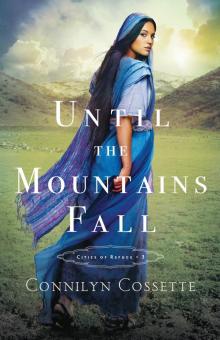 Until the Mountains Fall
Until the Mountains Fall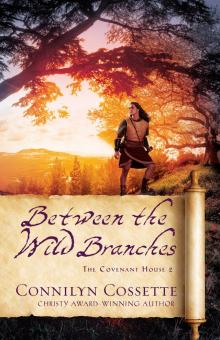 Between the Wild Branches
Between the Wild Branches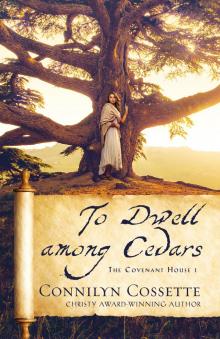 To Dwell among Cedars
To Dwell among Cedars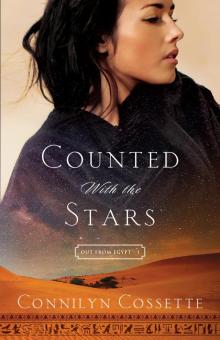 Counted With the Stars
Counted With the Stars Shelter of the Most High
Shelter of the Most High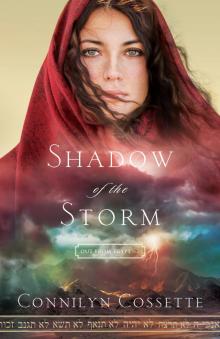 Shadow of the Storm
Shadow of the Storm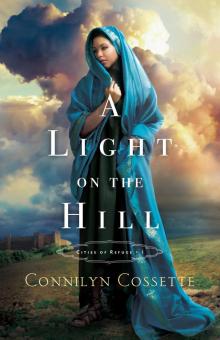 A Light on the Hill
A Light on the Hill Wings of the Wind
Wings of the Wind